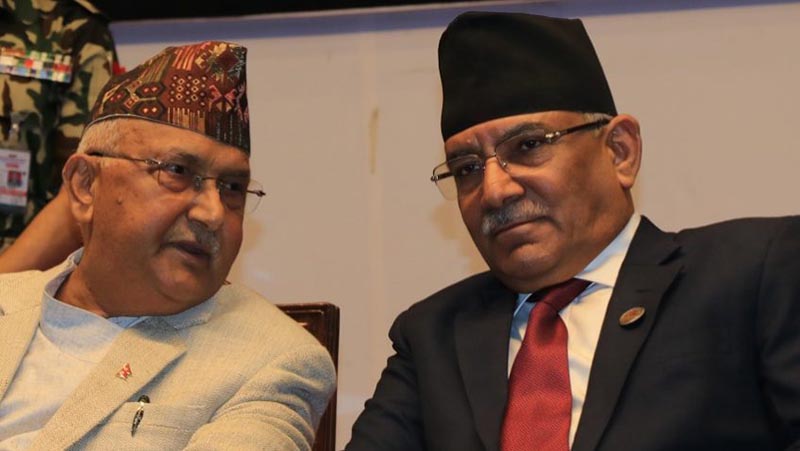Oli-Dahal tussle out in the open
Kathmandu, June 8
The power struggle within the ruling Nepal Communist Party (NCP) has spread due to trust deficit between co-chairs Prime Minister KP Sharma Oli and Pushpa Kamal Dahal.
According to NCP sources, the party’s ideology, organisation and power-sharing are key issues that have widened the rift between Oli and Dahal, who often portray themselves as co-pilots of the same jet.
“Both factions are scrambling to retain their hold on the party as intra-party rift delays completion of the merger between then CPN-UML and the then CPN-Maoist Centre,” a senior leader told THT.
Last year in May, the NCP’s co-chairs promised to complete the unification process within a year. “But, some of the crucial tasks, including appointment of in-charge and co-in-charge of districts, formation of politburo, work division of the party’s members and appointment of department heads, among others, are yet to be accomplished,” the leader added.
Firstly, the power struggle within the NCP’s organisation surfaced after Oli proposed Home Minister Ram Bahadur Thapa as chief of the organisation department, one of the most powerful party departments, in the central secretariat meeting while Dahal came up with the name of Bam Dev Gautam to head the same department.
“Thapa, who became home minister from the then Maoist Centre’s quota, has now tilted towards Oli,” a leader said, adding that Dahal also counteracted by presenting Gautam for the same post. Dahal also consulted with senior NCP leader Madhav Kumar Nepal about picking Gautam, who is critical of Oli, to head the party’s organisation department, he claimed.
Secondly, there is also ideological difference between Oli and Dahal factions. Deputy Prime Minister Ishwor Pokharel, who is a close aide of PM Oli, started ideological debate against leaders of the then Maoist Centre, while Dahal himself stood against Pokharel’s statement.
On May 17, Pokharel had stated that there should be discussion on the party’s ideology and it couldn’t abandon People’s Multi-party Democracy, which the then CPN-UML had adopted. The former Maoist Centre has, however, pitched for 21st-century People’s Democracy. In response, Dahal reacted saying if leaders had continued debating ideological issues, unification would never have happened.
Thirdly, there is the widening trust deficit between Oli and Dahal on power-sharing, according to a leader. “When PM Oli embarked on his India visit to attend Indian Prime Minister Narendra Modi’s swearing-in ceremony, Dahal publicly talked about power sharing agreement with Oli by revealing the five-point agreement signed on 16 May 2017, just a day before announcement of party unification.”
The sudden revelation of an agreement, which states that Oli and Dahal will lead the government by turns, irked the prime minister. “Oli then replied that he would be in power for only four to five days,” the leader recounted.
Surya Thapa, a central committee member and also an aide to DPM Pokharel, recently posted on Facebook that Dahal was only favouring the then Maoist Centre leaders and he had not been working like the co-chair of the party.
In response, Devendra Paudel, a central committee member and a close aide to Dahal urged the leadership to follow the spirit of the secret agreement signed by the co-chairs on May 16 last year.
NCP’s standing committee member Ghana Shyam Bhusal said if the co-chairs only struggled for power ignoring the party’s guidelines, the tussle would continue.






